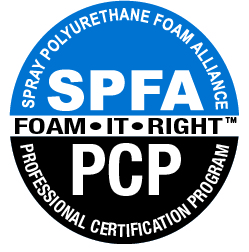
Last week we talked about Jobsite Cleanup and learned about trimming and cutting the foam, cleanup and disposal of the foam pieces and disposal of drums. This week we are going to discuss SPFA Certification.
Over the past few weeks we have discussed many topics related to spray foam insulation and its application. If you were not already aware of this, by now you should know that spray foam application is a technical process that is considered skilled labor and should be managed by trained, experienced and skilled professionals. This makes spray foam installers more closely related to other skilled labor, like electricians and HVAC mechanics, than they are to other insulation guys that work with fiberglass and cellulose. And like with other skilled trades, learning, growing and getting better is not a one-time event, it is a continuous process.
With that said, there are many resources available to help spray foam contractors, including various levels of assistance from manufacturers and an array of resources available from SPFA, SFC, OSHA and here at Spray Foam Advisor.
This includes SPFA’s Professional Certification Program (PCP), which is a multi-level certification program for professionals who install spray polyurethane foam insulation. The PCP covers two categories, insulation and roofing, and offers multiple certification levels, Assistant, Installer, Master Installer, and Project Manager, to accommodate the various personnel involved in the spray foam industry.
To qualify for certification applicants must:
- Complete the chemical health & safety course provided online by the Center for the Polyurethanes Industry (CPI).
- Pass the Professional Certification Program exams related to the levels of certification being pursued; note, the lower level exams are prerequisites for the higher levels.
- Master Installers must pass a field-conducted exam.
- Document spraying experience, and completion of CPR, first aid and OSHA safety courses for higher levels of certification.
- Maintain certified status annually.
- Recertify every five years with SPFA.
Spray foam contractors should seriously consider SPFA’s Professional Certification Program and how it can help them create differentiation in an increasingly competitive market. The key benefits of the PCP include:
- Installers can demonstrate knowledge, skills and abilities
- Consumers can identify spray foam contractors who employ certified personnel
- Designers have confidence that installers have a commitment to safety, quality and professionalism
If I were on the application side of the business, I would use the Professional Certification Program as a marketing component of my business and I think you should do the same. You should promote the certifications that your team has achieved, educate consumers about choosing a qualified contractor and build confidence and trust with builders, designers and other building professionals. This creates differentiation and value, two components to building a successful business.
Best of luck in these endeavors and stay tuned next week as we discuss the SPFA Certification Levels, right before the 2016 SPFA Convention. It’s not too late to get signed up and join us in sunny Orlando, FL, February 8th – 11th. If you do, make sure to check out my seminar Thursday morning, Feb. 11th, as we discuss 3 Ways to Close More Sales with Building Science.
Keep in touch with Spray Foam Advisor and get your FREE copy of 25 Spray Foam Insulation Frequently Asked Questions here.


